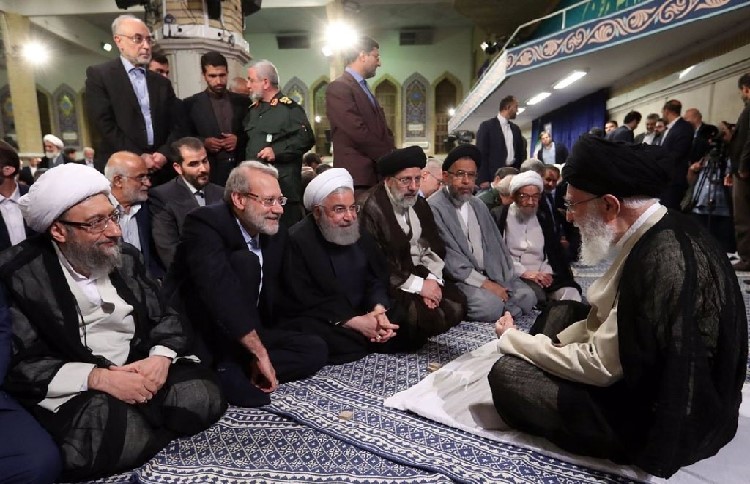
By Pooya Stone
After the disclosure of 63 bank accounts of the former judiciary chief Sadegh Amoli Larijani, Iranian citizens expected authorities to put an end to the systematic corruption in government apparatuses. The replacement of Larijani with Ebrahim Raisi prompted optimist observers to speculate that the state will stage an investigation about suspicious bank accounts in the judiciary. However, it was later revealed that the accounts were only the tip of the iceberg.
In 1994, then-judiciary chief Mohammad Yazdi requested the supreme leader Ali Khamenei to issue permission for opening personal accounts. He argued that the act’s profits would cover the judiciary’s costs. In 1995, Khamenei confidentially issued the order that allowed the judiciary chief to have private accounts.
Since then, there have been personal accounts in the judiciary. No one knows the real value of these accounts and how their deposits are spent. These accounts were hidden, and only Khamenei and the judiciary chief had information about them. In this respect, the supreme leader and his appointees in the judiciary were not accountable to anyone.
Read More:
Budget Settlement Reveals Systematic Corruption in Iran
In 2016, during Larijani’s tenure, Iranian media exposed the judiciary chief’s 63 personal accounts for the first time. Additionally, it was revealed that Larijani earned over $66.5 million from these accounts’ profits annually. Notably, these accounts were considered illegal according to the Islamic Republic’s constitution.
Larijani’s case was never investigated. However, it proved that Iranian officials do not even obey their own laws, let alone global conventions and bills of the Financial Action Task Force (FATF). According to the constitution, the judiciary’s revenues from judicial cases should be collected in the government treasury account. Then, the judiciary receives its required amount from the administration and spends it according to a specified schedule.
However, over the past decades, the judiciary circumvented the law under Khamenei’s permission while it is formally the first party responsible for guarding the constitution. In fact, this system has directly spent huge assets to its advantage with impunity. Furthermore, the people’s property, like guarantees in judicial proceedings, are considered as “breach of trust.”
After exposing Larijani’s accounts, former member of the Parliament (Majlis) Mahmoud Sadeghi revealed that the judiciary chief has spent the profits from these accounts on housing and to the benefit of his judges. However, given the sensitivity of the issue and Khamenei’s previous allowance, the case and its surrounding discussions remained silent.
In response to Sadeghi’s remarks, Larijani said that these bank accounts had been opened by his predecessors. “These accounts are not private,” Larijani added to justify the judiciary’s corruption.
Read More:
Iran’s Judges Demand Bribes for Protesters’ Release
In 2018, despite the appointment of Ebrahim Raisi, who is closer to Khamenei than his predecessor, as the new judiciary chief, the issue still remained in the dark. However, in its report on June 5, 2020, the judiciary media center announced, “The total profits of the mentioned accounts in 2019 were more than $32.5 million but $30.3 million have been spent.”
About the judiciary’s 63 accounts, Raisi claimed that these accounts have been reduced to five in his tenure. However, according to the mentioned report, the profits of only five accounts were equal to $32.5 million, let alone the profits of a total of 63 accounts during the past decades.
Two days later, court hearings of Akbar Tabari, Larijani’s executive deputy, begun. Tabari’s trial is another view of old infighting between the Larijanis and Raisi.
In October 2018, Larijani dismissed Mohammad Saeed Mahdavi-Kani and appointed Hossein-Ali Saadi as the president of the Imam Sadegh University. At the time, Larijani was the chairman of the university’s leading board. Notably, Raisi has amicable relations with the Mahdavi-Kanis.
Raisi took revenge on the Larijanis by replacing Larijani’s brother Mohammad Javad with Ali Bagheri-Kani as the judiciary’s Deputy of International Affairs and Chief of Human Rights’ Staff. Moreover, Raisi filed Tabari’s corruption cases for the establishment and leading a bribery network. Tabari and his sophisticated network had received huge bribes to intervene in judicial cases.
“The defendant met with allegedly prominent people in the judiciary’s executive branch to resolve their judicial problems,” said the representative of prosecutor Rasoul Ghahremani in the indictment issued against Tabari. For about two decades, Tabari served as the deputy of at least two judiciary chiefs. However, the ayatollahs are now sacrificing him to whitewash the corrupt cases of Larijani and Khamenei.
The recent developments and the revelation of systematic corruption among high-ranking ayatollahs will ignite public ire. For many years, the Islamic Republic’s authorities have duped citizens through hollow promises while they themselves were filling their pockets with dirty money. Khamenei frequently warned his agents about public distrust. However, all of the people of Iran know that his genuine concerns are about a new round of nationwide protests leading to the collapse of the entire ruling system.
Read More:


